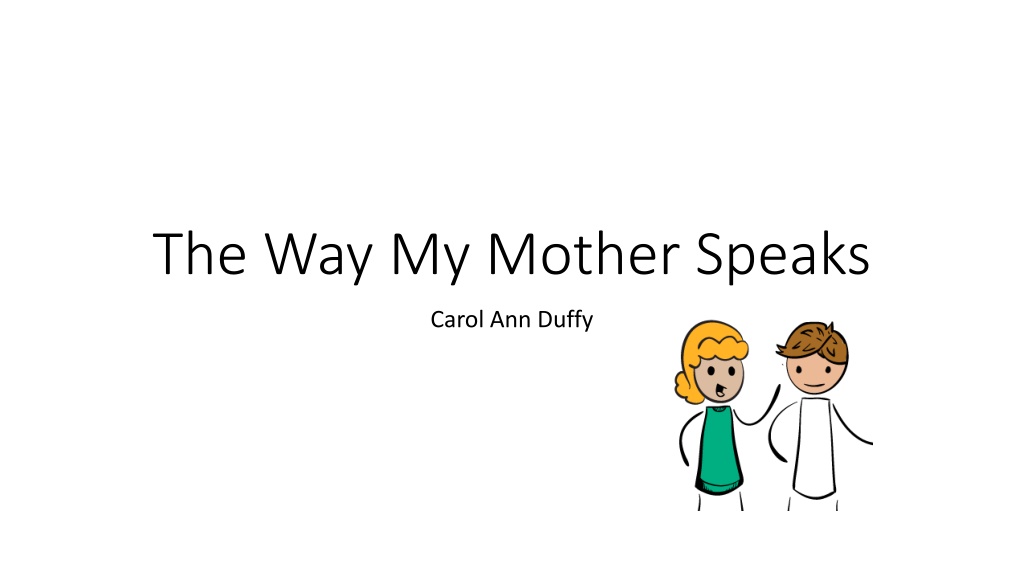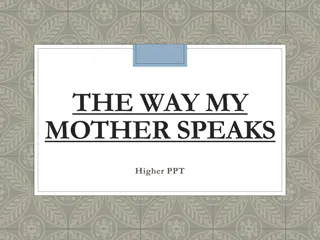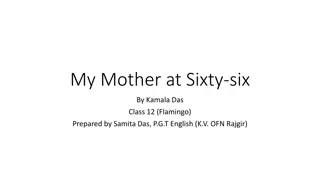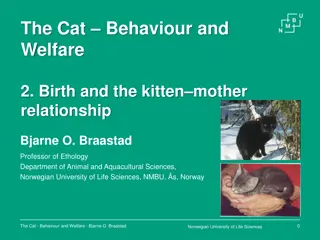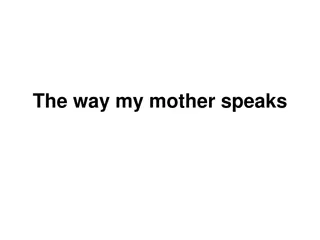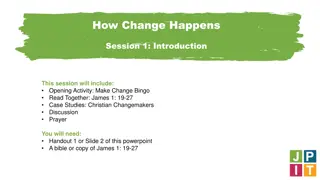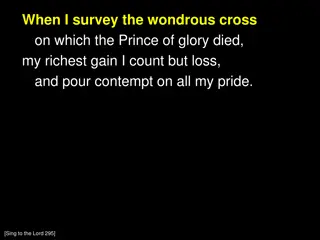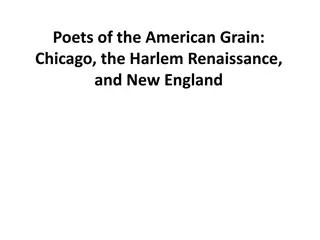The Way My Mother Speaks - Reflections on Change
Duffy's "The Way My Mother Speaks" explores the transition from childhood to adulthood through a train journey, reflecting on the universal pain of change and the challenges ahead. The poem's form and structure mirror the rhythm of the train, conveying the speaker's limbo state using repetition and contrasts. The title evokes permanence amidst change, highlighting the complexities of language, culture, and belonging. The first-person narrative draws us into the speaker's introspective journey of self-discovery and emotional reflection.
Uploaded on Sep 18, 2024 | 0 Views
Download Presentation

Please find below an Image/Link to download the presentation.
The content on the website is provided AS IS for your information and personal use only. It may not be sold, licensed, or shared on other websites without obtaining consent from the author. Download presentation by click this link. If you encounter any issues during the download, it is possible that the publisher has removed the file from their server.
E N D
Presentation Transcript
The Way My Mother Speaks Carol Ann Duffy
Overview Overview Duffy reflects on the transition between childhood and adulthood. This intense period of change is explored through a train journey away from home. The speaker is in limbo and reflects on their life and the challenges ahead. It represents the universal pain of change
Form and Structure Form and Structure The poem mirrors the rhythm of the train to show us that the speaker is in a state of limbo between two important stages in their life. The poet conveys this rhythm through the use of repetition and explores the difficulties experienced at this time of change through the use of contrast, contradictions and paradoxes. This highlights the confused state of mind at this time of their life. There is no regular pattern/rhyme scheme for the stanzas as this is an unusual experience they are going through Uses first person narrative to draw the reader in and make this seem more personal and powerful
Title Title The title of the poem evokes the antithesis of change, something permanent and attaching. The words say more to us than their actual meaning: The Way my Mother Speaks is about one person and her idiosyncrasies, but it also reflects a dialect, a specific area. It conveys a sense of belonging to one s family, roots and culture, all embodied, with love, in the character of the mother. It also implies that there are differences, language and culture changes to be discovered when we leave.
I say her I say her phrases to myself in my head phrases to myself in my head First person narration This makes us immediately aware that the persona is speaking about their own mother. The expression shallows of my breath reminds us that the speaker longs to hear these familiar words, but can only voice them privately and quietly so as not to be overheard. We realise they are on their own.
Restful shapes moving Restful shapes moving Paradox This image reflects the speaker's confusion. We can understand that the train is moving, not the scenery. Yet it is easy to perceive it the other way round, as we are stationary, probably sitting down. Creates the sense that the speaker is getting left behind as they are still emotionally rooted with their mother
The day and ever. The day and ever. The day and ever. The day and ever. The use of Italics and repetition highlight the rhythm of the train. It also makes us aware that the speaker is in tune to this rhythm and thinks about their mother. The Italics alert us that these are the very words spoken by the mother. They represent the speaker's sense of loss as they are moving away from their roots. They do not want to forget.
Stanza 2 Stanza 2 Change is also very present in the second stanza. The train journey is evoked again. The poet emphasises its tedium with the use of broad vowels, such as slow, goes down, browsing , but it is in the contrast and contradictions that we find their attitude to the changes that are upon them.
t too blue swapped for a cool grey oo blue swapped for a cool grey The use of assonance draws our attention to Duffy s choice of colours. The blue here has connotations of sunny weather, warmth and comfort, laughter. This represents their home life, protected and cherished by their mother. The grey represents the uncertainty of the future, the potential for rain, seen here as metaphorical tears. A complex contradiction is then offered to us. Once more this contradiction has to be read both literally and figuratively.
Nothing is silent. Nothing is not silent. Nothing is silent. Nothing is not silent. The use of negative represents the reluctance the speaker has at jettisoning their past behind. The double negative is perhaps a realisation that they do not really have to abandon their roots, that they can carry them within them. The sounds in their head are therefore silent, but not quite as they can hear them as if they were real. These complex images and ideas help us to understand their feelings of loss, hesitancy and confusion.
Stanza 3 Stanza 3 The final stanza is more positive. At times you can feel the sense of excitement felt by the speaker on the threshold of adulthood: the joy of taking charge of their life, yet the bittersweet emotions that come from leaving the safety of childhood behind. This is explored through the extended metaphor of the pond.
Like a child/and dipped a net/in a green Like a child/and dipped a net/in a green erotic pond erotic pond Simile and metaphor The image shows the tentative approach, dipped , and the excitement of the undertaking. This image is offered to us among contradictions which emphasise the conflicting feelings of the speaker Shows a connection to past memories Childlike innocence alongside the emerging adult identity that the speaker must now embrace in order to thrive.
Only tonight/I am happy and sad Only tonight/I am happy and sad Word choice/contrast These emotions feel at odds with one another, yet we can understand them as we, ourselves, are likely to have experienced them at some stage. The use of only helps us realise that this is a once in a lifetime occasion for the poet, as indeed for us all. We sympathise with the poet as we grasp the magnitude of the change.
I am homesick, free, in love/with the way I am homesick, free, in love/with the way my mother speaks my mother speaks List This contradiction, once explored, leaves us on a much happier note. It feels as if the journey and the limbo are coming to an end, and the speaker is moving forward, having understood that their love for their mother, for their culture and their roots will remain within them whatever. They feel free to follow their own path, sure that back home , the warmth, familiarity and love are still with them if they need it.
Overview Overview Duffy presents us with a journey through a period of life. This is both a real and metaphorical journey through life. By using the image of a train and creating contradictions and paradoxes around the train, the scenery and the sky, she helps us understand the speaker s confused emotions and to identify with them as well. All of us have been on a train journey, all of us will have to make the journey from childhood to adulthood and leave the security and warmth behind us. These emotions are made personal and specific at the same time through the very characteristic use of language of the poet.
I say her phrases to myself in my head Quietly, but shallow breathing is also a symptom of anxiety or under the shallows of my breath, restful shapes moving. The day and ever. The day and ever. Paradox. The train makes moving restful. The confusion echoes the confused feelings of the persona Repetition mimics the movement of the train
Broad vowels slow reading down, echoing the slowness of the journey away from home The train this slow evening goes down England browsing for the right sky, Assonance highlighting more contradiction and confusion in the persona s feelings. Blue skies represent happiness, grey misery. too blue swapped for a cool grey. For miles I have been saying What like is it the way I say things when I think. More contradiction double negative perhaps reflects the persona s ambiguous feelings about leaving home. Nothing is silent. Nothing is not silent. What like is it. Thin, sharp vowel contrast with broad vowels at the beginning of the stanza. Convey feeling of anxiety?
More contradiction, but using contrast in a more confident and positive way. Only tonight I am happy and sad like a child Beginning of one life and end of another. Nostalgia for the world of childhood but new world offers unplumbed depths of possibility to explore who stood at the end of summer and dipped a net in a green, erotic pond. The day and ever. The day and ever. I am homesick, free, in love Nostalgia. Ready for her new life, leaving the old one behind but still a support to her. with the way my mother speaks. Repetition again emphasising that the journey is still in progress.
